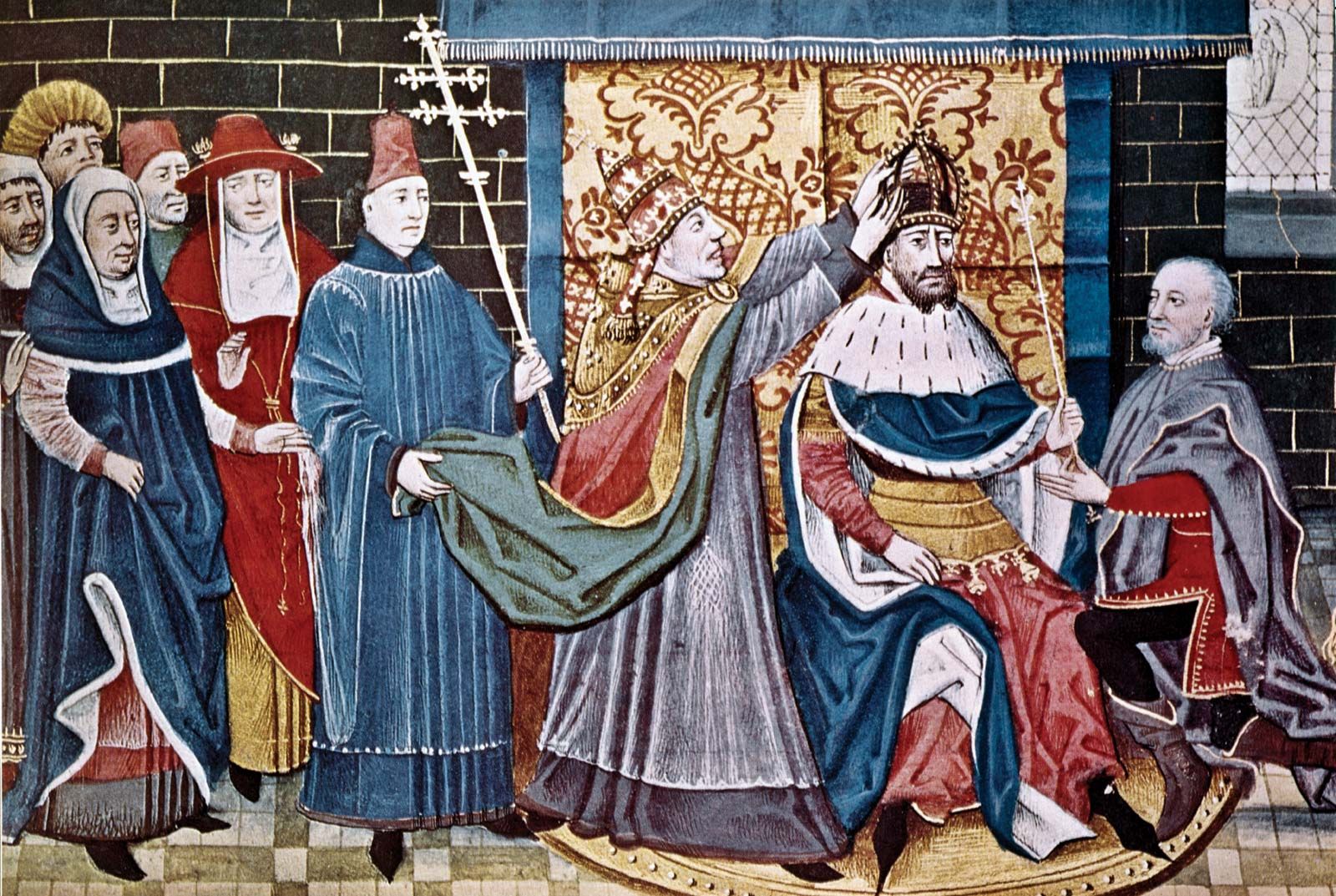Frederick II is perhaps the most interesting medieval monarch. Intelligent and cultivated, he took a deep interest in scientific experiment, wrote poetry in Italian, wrote on the sport of falconry, and was a superb politician. He was cynical, tough, a sound diplomat, an able administrator, and a statesman. Furthermore, he felt at home in Sicily—the sophisticated society in which his mother had grown up—and greatly preferred it to Germany.
In Sicily Frederick imposed his own completely centralized monarchical form of government upon his Italian subjects. Feudal custom was wiped out and trial by battle forbidden. At Naples Frederick founded a university, which became a state training school in which officials could be grounded in the Roman law. His army and navy were organized on a paid rather than a feudal basis. Finances were regularized and modernized, and an imperial bureaucracy collected taxes on incoming and outgoing merchandise.
The Germans felt that they had no stake in Frederick’s empire. He could never extend to Germany the centralized administration that he built in Sicily. Indeed, when in 1220 he obtained for his son, Henry, election as king of Germany and a promise from the bishops and abbots that Henry would be the next emperor, he granted still more privileges to these ecclesiastical princes.
Frederick abandoned his right to set up mints and customs stations in their territories, together with royal rights of justice. He promised to exclude from imperial cities any serfs who might run away from church lands to try their fortunes in the towns, and he agreed to build no new towns or fortresses on church lands. In 1231 the secular German princes exacted similar privileges from Frederick. In Germany both the ecclesiastical and the secular princes had become virtually independent.
Yet the preoccupation of Frederick II’s reign was his tremendous conflict with the papacy. His opponents were Honorius III (r. 1216-1227), Gregory IX (r. 1227-1241), and Innocent IV (r. 1243-1254)—who were consistently determined to prevent him from achieving his aims. Honorius did crown Frederick emperor in 1220, but before Honorius died, Frederick was already asserting himself in sensitive Lombard territory. During the emperor’s absence from Italy on a crusade, Gregory IX’s newly hired mercenary armies attacked his southern Italian lands.
When Frederick returned, he was able to make peace temporarily, but he soon created further trouble. After he had defeated the Lombard towns in 1237 for refusing to keep the terms of the Peace of Constance, he announced a new plan to extend imperial administration to all Italy, including Rome. So in 1239 the pope excommunicated him and war was resumed.
Violent propaganda pamphlets were circulated by both sides. The pope called Frederick a heretic who was trying to found a new religion. Frederick called the pope a hypocrite and urged all monarchs in Europe to unite against the pretensions of the church. Hemmed in at Rome by the encroaching imperial system, the pope summoned a church council, presumably to depose Frederick. But Frederick’s fleet captured the entire council of more than one hundred high churchmen.
Just as Frederick was about to enter Rome itself, Pope Gregory IX died (1241). Frederick tried to install a new pope favorable to himself but failed. The new pope, Innocent IV, fled from Italy, summoned a council to Lyon (1245), and deposed Frederick. There followed five more years of struggle; but before the conflict had been settled Frederick died in 1250.
In its last phases, when he was locked in combat with Innocent IV, Frederick wrote a letter to the princes of Europe furiously attacking the clergy for their greed. He himself, he said, would reform the church by confiscating all its wealth. Maybe a return to the poverty of the early Christian days would breed saints who would heal the sick rather than clergymen who stuck their noses into political affairs. In response, Innocent IV’s propagandists had to fall back on a new interpretation of the Donation of Constantine, claiming that the popes had always had the right to make and unmake emperors.
After Frederick’s death, the papacy pursued his descendants with fury. In 1266 Charles of Anjou, the ruthless and able brother of Louis IX, king of France, was brought into Italy as the papal candidate for the southern territories. He defeated and killed Frederick’s son and grandson and established himself as king in the south.
By 1268 the Hohenstaufen line was extinct. The Holy Roman Empire had been destroyed by the papacy. Yet within only forty years of Charles of Anjou’s entry into Italy as the instrument of papal vengeance, Charles’s grandnephew, King Philip IV of France (Philip the Fair), would puncture the temporal claims of the papacy and carry it off to “captivity” in France.
In Germany the imperial throne remained vacant from 1254 to 1273. The princes were pleased for a time not to have an emperor; their usurpation of rights that had formerly belonged to the monarchy was now well on its way to completion. Meanwhile, the old links with Italy were virtually broken.
Imperial preoccupation with Italy had ensured that the princes would emerge as the real rulers of Germany. Thereafter particularism, an intense localism, would dominate in Germany until the nineteenth century, while united nation-states were rising in the West.

